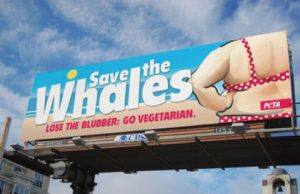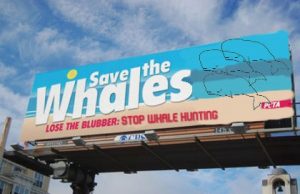
The initial billboard advertisement had a confusing message that had no concrete message and it was hard to understand what exactly the billboard was trying to convey. The billboard’s main message was to save the whales, but the subtext was telling everyone to go vegetarian as a way to save the whales. The advertisement was from PETA, which makes sense that they are advocating for vegetarianism and the protection of whales. PETA is an organization that advocates for ethical treatment of animals, which would make sense for the preservation of whales.
However, the message at the end about going vegetarian does not make sense because going vegetarian does not miraculously save the whales because many individuals that hunt for whales use the blubber and meat for other purposes besides for food. The message should have focused on the problems of commercial whale hunting and that the industry of whale hunting are decreasing the whale population at a scary rate that could cause endangerment or even extinction.
However, the major problem of this advertisement was the “fat shaming” portion on the right side of the billboard that displayed an overweight individual with the caption “lose the blubber” as a way to talk about the person of being fat because they are eating whales, but also connecting it to whale blubber as a second meaning. It can be also seen as the billboard describing the individual as a whale as to save the individual being called a whale by losing blubber by changing their lifestyle to a vegan/vegetarian lifestyle. The main focus to fix the billboard advertisement would be to get rid of the fat shaming and to focus more on the problems of commercial whale hunting.

The new advertisement changed from having two different meanings making it difficult to understand what the message is trying to actually convey. I strayed away from the idea of changing to a vegetarian lifestyle because it is not a major issue and people have the freedom of choice to choose if they want to adopt a vegetarian lifestyle or stay as an omnivore.
The focus of the advertisement is about commercial whale hunting and that saving the lives of whales is the main message PETA is trying to convey to the public. The idea of fat shaming as a way push the agenda of vegetarianism was not the right method to promote a vegetarian lifestyle because the public perception of vegan/vegetarianism already have a negative outlook and have a specific stereotypical image of how a vegan promotes their lifestyle. Fat shaming would just aggravate individuals and would promote the stereotypical image of a vegan if the message was created in a way to make someone feel bad for being fat.
The idea of using dead whales is a method of shocking the individual, but the picture I used was to go along with the original idea of using cartoons rather than using real life pictures of a dead whale. Using a real dead whale would constitute negative feedback of showing the public a picture of a real whale could be scarring to children that may see the billboard. The subtext was altered as well to get rid of the vegetarian message as the focus was changed to whale hunting, where it targeted the industry of whale hunting rather than shaming individual’s lifestyle choices for their dietary and eating habits.
Reference: Links to images
https://dribbble.com/shots/2058157-Dead-Whale
https://s18955.pcdn.co/wp-content/uploads/2019/06/PETA-controversial-ad-example-min.jpeg
